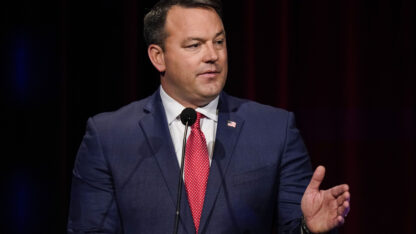Georgia lawmakers face thorny health issues during new legislative session

The 2023 legislative session got underway Monday, Jan. 9, 2023.
Lawmakers are back at the Capitol this week for the new legislative session, and they’re facing a host of big health issues again this year.
Last year’s bipartisan Mental Health Parity Act outlined a roadmap for improving Georgia’s mental healthcare system over the next few years.
One key provision already in effect prohibits insurance companies from denying coverage for mental health care.
Jeff Breedlove is with the Georgia Council for Recovery.
“So when a family is in crisis with mental health or addiction,” he said, “families are finally going to going to be able to get the coverage they they’re entitled to under under the law in Georgia.”
Now, Breedlove said more needs to be done across the state.
His newly announced statewide coalition, The Substance Use Disorder Policy Partnership, is banking on incoming Republican House Speaker Jon Burns to help build consensus around boosting mental health services.
“The numbers are going up on overdose deaths. And the funding for existing programs needs to keep pace with the medical reality,” Breedlove said.
That medical reality is an epidemic of overdoses, mostly linked to opioids.
The CDC reports there were an estimated 107,622 drug overdose deaths across the U.S. in 2021, up nearly 15% over 2020.
And, in Georgia, the Department of Public Health reports opioid-related overdose deaths have risen by 207% between 2010 and 2020.
To help curb overdoses, Breedlove’s group wants more money for peer-led treatment and addiction recovery programs, and to grow the state’s workforce of mental health providers.
Fully expanding Medicaid under the Affordable Care Act would go a long way toward helping with that funding for mental health.
It would also strengthen state’s struggling hospital system, health advocates say.
Monty Veazey heads the Georgia Alliance of Community Hospitals. He said that while support for full expansion at the General Assembly is increasing little by little, Medicaid expansion remains far off in Georgia.
“We have to have a leader to step up and say, this is what we’re going to do. And once we get that done, we will have Medicaid expansion,” he said. “It will cost the state around $500 million a year, but we do have positive revenue growth in Georgia. I think we could absorb that.”
Advocates have so far not been successful in convincing Gov. Brian Kemp or powerful General Assembly Republicans to do it.
And Georgians for a Healthy Future director Laura Colbert said Medicaid expansion is a long shot this session too.
“The governor does not have any meaningful motivation to move forward with Medicaid expansion because he won so decisively in November,” she said, “and because he got the green light on his Pathways waiver.”
Georgia Pathways is Kemp’s limited expansion plan, initially greenlit by the Trump administration.
It would cover about 50,000 adults with low incomes or disabilities as long as they work or volunteer for 80 hours a month.
Critics say full Medicaid expansion would cover almost a half-million currently uninsured Georgians and save the state more money per person covered.
Under full Medicaid expansion, according to an analysis by Kaiser Health News, the federal government would kick in at least 90% of the costs, compared to 67% under Kemp’s plan.
For now, the limited expansion work-requirement plan could take effect as early as this summer.
The General Assembly may also take up the issue of abortion access during this legislative session.
A lawsuit challenging the state’s House Bill 481 law banning abortion after around six-weeks of pregnancy is heading for a hearing at the Georgia Supreme Court this spring.
It remains to be seen whether anti-abortion lawmakers would pursue further restrictions to the procedure in 2023, such as a bill prohibiting abortion medication by mail.
A similar effort failed to pass last year.








